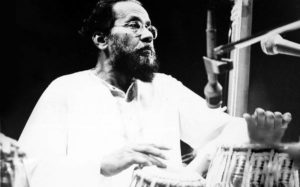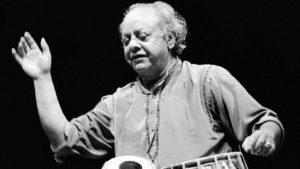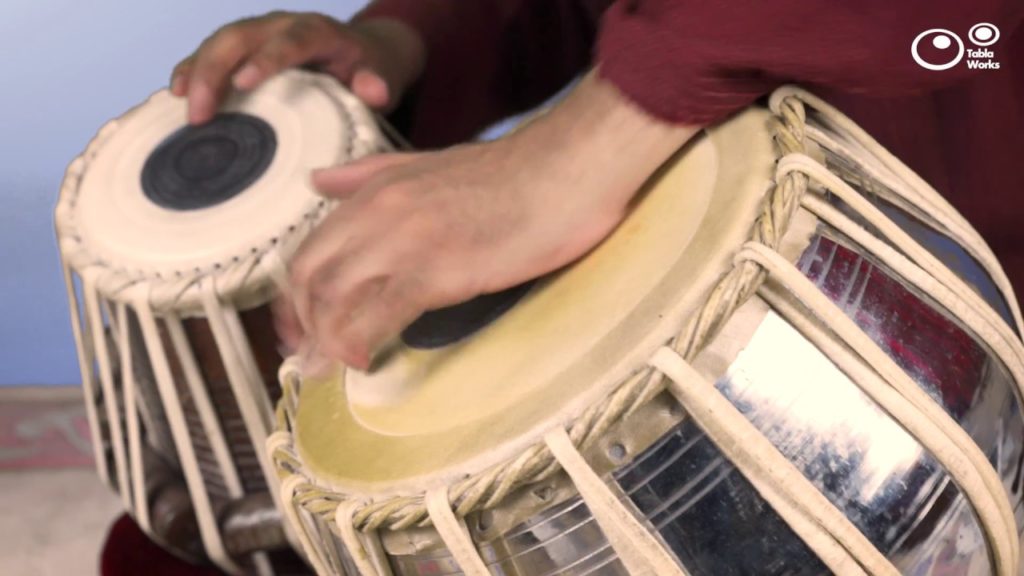THE EPIC CENTURY
— with Pandit Nikhil Ghosh & Ustad Allah Rakha
(An outward study on their styles and the correspondence they exemplified)
(Reading Time: 22 min Approx)
Two people hailing from two different backgrounds come floating straight by two opposite streams, moving at two different velocities, with two different mental stature, to the contact point where both of them take up the same profession having the same point of interest with a great knowledge of the same philosophy, have the same thought processes going to the same direction, being fascinated by the same musical instrument belonging to one single genre of music – the Tabla.
The instrument, Tabla, is in general believed to have been derived by Hazrat Amir Khusrao during the reign of Allauddin Khalji in India; but the fact has later been vindicated by musicologists that, the instrument traces its origin back to the thirteenth century and had been derived from the Pakhawaj by Ustad Sidhar Khan of Delhi as an appropriate instrument to accompany Khayal following its evolution from Dhrupad, with which, the Pakhawaj would be played for accompaniment. Historians do believe, since in the olden days, there would be a pair of drumming instrument in the lands of the Arabs called Tabaljung, the Tabla has been derived from the same. Such a dynamically significant drumming instrument had two of the greatest contemporary practitioners of the same, Pandit Nikhil Jyoti Ghosh and Ustad Allah Rakha Qureshi to spread and nourish two different branches of the evolution of the art of playing and teaching it. One marked similarity between the two careeristic approaches as had been put forward by them was that, both of them were primarily earnest vocalists before opting for practicing the Tabla for the rest of their life.

Pandit Nikhil Ghosh, born on the twenty–eighth of December 1918 in Barisal, East Bengal, British India completing his initial training from his father, being subsequently taught by three of the greatest masters of the Tabla of the Farrukkabad school, namely, Pandit Jnan Prakash Ghosh, Ustad Amir Hussain Khan and Ustad Ahmadjan Thirakwa, beheld the twentieth century with the viewpoint of a Bengali musician, who, apart from being a great performer all across the world; he was the first ambassador of the Tabla to the Western world; was also highly regarded as a teacher and a strong authority of all the different schools of the Tabla.
The highly patronizing family of Ghosh helped him to develop an individual perception about the form of art he practiced, that comprised of a vast and dynamic knowledge ranging from the history of the Tabla to the different scientific techniques of playing it. It’s easily perceivable for the listeners of his music, he had a unique approach to keep up the authenticity of the style he would play. All his performances, as available in records indicate toward his tendency to protect his knowledge from getting digressed toward the non-classicistic norms. The learners of music on the one hand observes him as an orthodox scholar of music and on the other hand accepts the notion, his introduction of new concepts into the subject surely points toward the fact he had a modernistic aptitude toward music in mind. His stamped conventional method of execution of his music must be believed to have been acquired from the training of Dhrupad he had received from his grandfather, Pandit Hara Kumar Ghosh. Also, his close association with the legendary vocalists of his time, such as, Ustad Fayyaz Khan, Ustad Aman Ali Khan, Ustad Mushtaq Hussain Khan, Ustad Abdul Wahid Khan and the likes developed his rich vocalism which later helped him to interpret the Tabla as a holistic instrument.
Ustad Allah Rakha, on the contrary, a deep practitioner of the tradition, was born in the village of Ghagwaal in Jammu-Kashmir, British India, on the twenty–ninth of April 1919. The young boy was only twelve years old when he was attracted to the sounds of the Tabla. His quest for an alternative life can well be discovered from the very incident of his running away from his home to learn the instrument from Ustad Miyan Kader Baksh. The enhancement of his musical skills was further supervised by Ustad Ashiq Ali Khan from whom, he learnt vocal music. His revolutionary contribution to Indian music ranges from his playing the first ever solo playing of the Tabla to be broadcast from the All India Radio to taking the first step to popularize the Tabla all across the world to collaborating with various artistes from the Western part of the world. He is till date considered as one of the inseparable legendary duos of Indian classical music, the other being his long-time collaborator, Pandit Ravi Shankar.
His contribution to the Punjab school of the Tabla is inexplicable for he stands as the primary developer of the school as the one and only authenticated composer of various Bandishes belonging to it, of the entire century. His performances make the note of his wizardry over the mathematical aspect of the Indian music, a point often overlooked by Master of Music of the previous generation. His modernism is quite often proved from the various inartificially successful attempts to present mathematically justifiable compositions. Listeners of their music could draw a distinctive line of separation between the art of playing the Tabla before the century they were born in and after the birth of the new century as signified by them.

However, it cannot be possible for any of the observers of both of the maestros’ music to collide one onto the other, for, Ustad Allah Rakha and Pandit Nikhil Ghosh prove to be complementary to each other with respect to the time both of them were carrying forward the instrument, Tabla. It is quite a lot significant to make an adequate argument at this moment that tradition is always prior to modernity. The greatest advantage for the development of the modernist thought in the subject, Tabla, during the mid-twentieth century, the time of both the existing masters, is that, along with a modernist, there was a traditional practitioner of the same art who was the closest contemporary of the former. The evolution of the music in India during the twentieth century probably has to consider this particular incident as the most important one for it assures the gradual development of Indian music parallel to a successful trial of maintenance of the orthodoxy of the same. The Tabla, an instrument often admired for its dynamicity must be credited for having a legitimate improvement in the way of practicing it as supervised by two greatly close contemporaries – Ustad Allah Rakha and Pandit Nikhil Ghosh, one authenticating the tradition of it and the other justifying the same with a modern viewpoint, one establishing himself a corollary to the other.
I distinctly remember of making a mention of the actively modernistic mind, underneath the rigidity toward convention, of Pandit Nikhil Ghosh at the very beginning of the discourse. This argument can further be signified by the following anecdote.
We all know, Pandit Nikhil Ghosh was the brother of the pioneering figure of Indian classical flute, Pandit Pannalal Ghosh. Once they would sit for practicing together elaborating upon Taalas like Jhoomra or Tilwada at the Vilambit or a considerably slow tempo, Pandit Nikhil Ghosh would remove his hands from the Tabla and stop playing, Pandit Pannalal Ghosh being left to play simultaneously counting the rhythmic cycle. Pandit Nikhil Ghosh would recline in a separate room for the next fifteen minutes, and after that both of them would arrive at the Sam or the starting point of the cycle while they count it, meeting each other after the above-mentioned time gap. However, introduction of this fun element into practicing apart from indicating both of their pre modernistic attitude toward music, does suggest a revolutionary step of the Indian classical music taken. It is apparently contradictory to their background of learning Dhrupad, prevalent in their family itself, but their performances as have been heard from various records asserts the recent point of analysis and vindicates that they had always been true to the existing convention even through their introducing some newness. On the context of his modernism, it would be rather unfair not to elaborate on some of the special features he introduced into the art of playing the Tabla strictly adhering to the tradition. His immensely intensified knowledge of vocal music helped him find the seven notes and twenty–two microtones of vocalism to have analogous to them in the Tabla, the seven major syllables and leading to altogether twenty – two syllables all the seven major ones getting permuted and thereby combined. He would also make a similar sound production as the instrument he would accompany, on the left-hand drum with the help of the change of tension as supported by the wrist. Such exemplars of novelty within the existing convention are bound to be acknowledged to give rise to a full– fledged development of the Tabla during the century.
Ustad Allah Rakha was not unacquainted with Pandit Nikhil Ghosh before the former developed closeness with Ustad Ahmadjan Thirakwa. Both of them would regularly meet in music festivals; Ustad Allah Rakha would particularly invite Pandit Nikhil Ghosh to the music conference he would organize in memory of his Guru, Ustad Miyan Kader Baksh and Pandit Nikhil Ghosh would also call him back to perform at his institution for music, Sangit Mahabharati; but, it was when Ustad Allah Rakha had the knowledge of Ustad Ahmadjan Thirakwa’s stay at Pandit Nikhil Ghosh’s residence and he would call him to his residence for two or three weeks that their bond of friendship even found stronger grounds, for, now they had the same man to love apart from the same to instrument to worship. It is known, Ustad Allah Rakha never formally received lessons of the Tabla from Ustad Ahmadjan Thirakwa but what speaks of his utmost reverence for this legend is that he used to call him ‘Abba’ meaning the father. That way, Ustad Ahmadjaan Thirakwa must be attributed to the honour of the man of the century who could whole heartedly influence the convergence of the two primary monumental figures concerning the Tabla. The friendship between Pandit Nikhil Ghosh and Ustad Allah Rakha that often took new turns from several events such as this was fruitful enough for both of them to have legendary principles of teaching the Tabla, another quite an important aspect of the subject, to have a union – this incident is surely worth highlighting.
While we arrive at the concluding segment of the discussion, it would be worth telling one particular tale that would fully assert their convergent thought processes to have divergent justifications for the same.
A Tisra Jaati Gat, the composition having syllables set in the division of each Maatra or each macro beat having three Anumaatras or micro beats, composed by Ustad Haji Vilayat Ali Khan, the founder of the Farrukkabad school of Tabla, would be played in two different tempos until it would be converted into a Chowpalli Gat, the composition having syllables set in the division of each Maatra or each macro beat having four Anumatras or micro beats, where each segmented but combined pattern of syllables would be played four times, by Pandit Nikhil Ghosh. Ustad Allah Rakha readily asked him to exhibit his expertise on the execution the composition without changing the vocabulary. Having proved himself adept at doing so, he played the composition at a concert but prior to it delivered a preface to the composition, comprising of his account of interaction with Ustad Allah Rakha regarding the same.
This stupendous but healthy competition within contemporaries has been seen in every aspect of art, culture, literature, politics and the likes all across the world, and it is this competitive relation within the contemporaries that has always led to the creation of the gentility of an era. Had Pandit Nikhil Ghosh and Ustad Allah Rakha would focus on the same aspect of the Tabla, such upliftment of the subject and such enormous influence of the subject over mankind in the later years would surely be impossible. It would be quite improper to elaborate upon the impact the two maestros of the Tabla created upon the century, without mentioning that the century had also seen both of them performing together on the dais once with the duet of Pandit Ravi Shankar and Ustad Ali Akbar Khan, the first duo on the fields of instrumental music and the other time with the duet of Ustad Vilayat Khan and Ustad Imrat Khan, the brothers whose names are synonymous with the Sitar, a string-instrument from India.
I finally end the present discourse acknowledging Pandit Nityanand Haldipur, one of the early disciples of Pandit Pannalal Ghosh, Pandit Yogesh Samsi, the disciple of Ustad Allah Rakha, Pandit Aneesh Pradhan, the disciple of Pandit Nikhil Ghosh, Pandit Nayan Ghosh, the illustrious son of Pandit Nikhil Ghosh and Ishaan Ghosh, the son of Pandit Nayan Ghosh, for, they have all helped me with the trivial details from which selective anecdotes could be referred to for the development of the entire work.
Subhadrakalyan


Excellent article. This ought to be published in journal of musicology